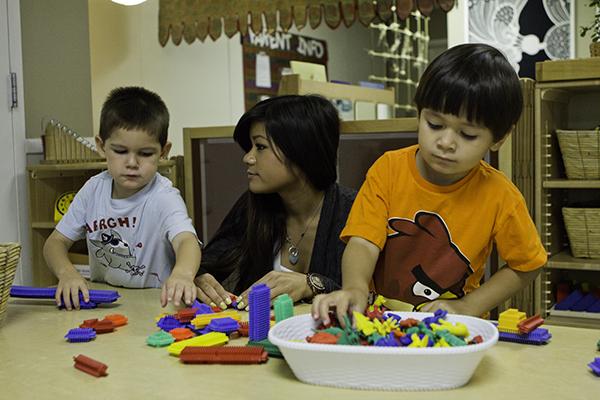Children’s Center gets accreditation for efforts

Brandt, in blue, and Tyler, in orange, play with building blocks as their student teacher, Caitlin, assists them.
September 21, 2011
The Associated Students Children’s Center was first accredited in 2005, which lasted for five years. The accreditation from the National Association for the Education of Young Children shows Sac State’s Children’s Center meets not only state and local standards, but also the essential national quality requirements for children’s centers in America.
“We are proud to be recognized by a system that helps our parents have confidence in their child’s placement in our program. This national accreditation helps to assure parents we are using the most current practices in the care of young children,” said Llani McCarthy, a teacher who has been working with infants and toddlers at the Children’s Center since 1978.
The Children’s Center is already licensed by the state of California Department of Social Services, and funded by the California Department of Education, but the center chose to seek accredition as well.
“It’s a one-year process that we started last fall. We looked at the newly added quality standards that added by the National Association for the Education of Young Children and made any changes that needed to be made. We collected a lot of evidence and examples of how we were meeting those high quality standards. We are in the top 7 percent of children’s centers in the country,” said Denise Wessels, director of the Children’s Center.
The college must submit an annual report each year for four years after accreditation to ensure the program is still running under the proper guidelines. The National Association for the Education of Young Children serves centers and schools with children from 6 months to 5 years old and each center must have a minimum of 10 children.
The association will serve any child care center, from a day care to a full military center, as long as the program has met minimum requirements. The association now serves 6,500 centers, with 653 claiming affiliation with a college.
“The accreditation system raises the bar for child care centers and other early childhood programs. Having earned this accreditation is a sign that Sac State is a leader in a national effort to invest in high-quality early childhood education,” said Jerlean Daniel, the association’s executive director.
The center offers breakfast, lunch and snacks for the children, which is included in child care fees (students may apply for child care financial aid).
“Health and safety in the program setting are of the utmost importance,” said association spokeswoman Gina Quirk.
The center is also required for national standards to have an area for the children to play and be active. Sac State’s center contains indoor and outdoor play areas for all the children to use. The outdoor area has received a donated sandbox.
The Children’s Center works with around 200 children at any given time, with about nine of them being babies up to age 2, who are kept in the Bambini Room. Twenty-one toddlers around 2 years of age stay in the La Casita Room, and the rest at almost kindergarten age occupy The Casas. There are different rooms for the children to keep them within their own age range and to ensure there are enough staff members per child.
Each room contains toys, a library and a small area for children who are sleeping. The center keeps enough teachers and staff on duty to watch all the children, employing around 90 student workers per semester usually hired through Federal Work Study.
“We hire within the school and open up the children to a lot of diversity, which is really great exposure for them,” Wessels said.
The center requires teachers to have a bachelor’s degree, a child development permit from the state’s Commission on Teacher Credentialing, previous experience with children and other additional training in order to meet the national requirements each year.
“Of course the most important thing is the relationships between teacher and child,” Quirk said.
In order to become accredited, the college must enroll in the program, submit paperwork on teachers, application and candidacy requirement forms, and receive an in-person visit from a member of the association. The National Association for the Education of Young Children made the visit on June 13, and the Children’s Center received its accreditation notification.
“For us it’s a huge source of pride, in that we have worked very hard to meet national standards,” Wessels said. “A program can volunteer to be evaluated on the national criteria, but for us it was important to show, not only to ourselves, but the families that we serve, and the college that we serve, that we meet these higher national standards.”
Ivy McDonald can be reached at [email protected]




























































































































